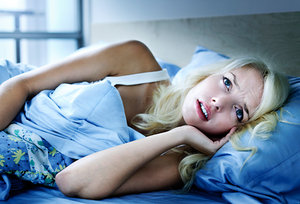Sleep is essential for your body to heal…so what happens if you can’t fall asleep or you have trouble maintaining sleep? When that happens, it can be extremely frustrating because for most of us, how we perform or feel the next day, depends on how well we’ve slept the night before. I know that I personally am not at my best if I don’t get a good night of sleep. So, what are the concerns in regards to insomnia? Why is poor quality of sleep such a health problem?
For starters, sleep is the time when our cells and organs can repair and heal itself. So if you do not get a good night of sleep, the concern is that over time, the body is never given adequate restoration or healing time. Also, many illnesses can lead to sleep issues so if you are having new insomnia issues, you may want to be checked for diseases such as, but are not limited to, autoimmune diseases, thyroid diseases, adrenal fatigue, dementia, depression, anxiety. Therefore, when you are having trouble sleeping, it may be an indication that your health isn’t at its optimal state. If you are indeed having new insomnia issues, you should definitely ask your doctor for a physical exam and lab tests for evaluation of your health status.
So, what can you use for insomnia without being worried about creating a dependency to medications or supplements for insomnia?
 In my clinic of integrative medicine, I usually recommend a few supplements as a starting point for insomnia. These supplements tend to be safer for the general public and people taking them can feel safe that they won’t become “dependent” on them. My top three favorites are:
In my clinic of integrative medicine, I usually recommend a few supplements as a starting point for insomnia. These supplements tend to be safer for the general public and people taking them can feel safe that they won’t become “dependent” on them. My top three favorites are:
- Theanine
- Magnesium
- 5-HTP or L-Tryptophan
Theanine is an amino acid that helps to calm anxiety and promote relaxation and rest. It is mild and can be used for those who find that they can’t shut off their mind when trying to go to sleep. You would take 100-200mg about 10 minutes before bed.
Magnesium is great at calming anxiety and for helping with quality of sleep as well. If you want to take it, have your doctor check your magnesium level and make sure you are safe to take it and ask your doctor at what dosage you should take it based on your labs. Magnesium is also necessary for muscle activity and will help those with leg cramps or muscle tightness and spasms if you are seen in your labs to be deficient. It tends to loosen your stool so it will help with constipation as well, but be wary of using this if you have a tendency towards loose stools or diarrhea already. Those with kidney disease may not be able to clear this as well, so make sure to check with your doctor before using this.
5-HTP or L-tryptophan has the added benefit of helping your mood and helps to put you to sleep. If you have low mood and insomnia, this potentially would be a good option for you. I generally recommend about 100-200mg of 5-HTP per night or 500mg of L-tryptophan per night for the average person with average weight and health. If you are on any anti-depressant drugs or any drugs that already have serotonin effects, you should not be using this and should clear it with your doctor first before trying it.
Although these options tend to have the most benefit with the least amount of problems and grogginess in the mornings, there are still a potential for interactions if you are on other supplements and medications so please clear any new supplements by your doctor first.
I know that most of you with insomnia probably have already looked into supplement options so probably know about other options like valerian root, lemon balm, melatonin, kava kava, and passionflower, just to name a few other options. But in my experience, these tend to cause more drowsiness in the morning and potentially have more side effects if you have environmental allergies to various plants. Having said that, these are still viable options for those with very severe insomnia and need stronger agents to get to sleep.
Either you use these herbs or the options I mentioned above, you should always clear your supplements with your doctor to make sure you are being safe…and most importantly, practice good sleep hygiene and avoid caffeine, turn down the lights a few hours before bed to get your body more relaxed and increase your own melatonin and don’t do activating activities like work or watch stressful shows before bed. Ultimately, good sleep hygiene is the most effective and safest way of helping your own body enter naturally into the restful stages of sleep you so desperately crave.